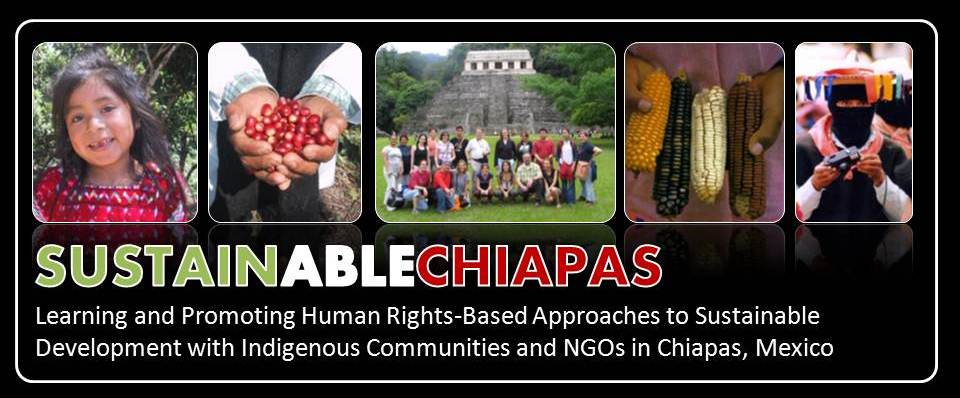 While in Chiapas I became deeply aware of the notions of respect and dignity. The indigenous concept of "making one's soul arrive," meaning to learn the value of hard work, of being humble and respectful, while complementing one's spouse, and serving the community, resonated with me. (Eber, 10, 12). Ideally, this focus on respect would also lead to harmonious relationships that emphasize equality between the sexes. However, complex socio-political, legal, and economic dynamics have created a reality that is far from ideal.
While in Chiapas I became deeply aware of the notions of respect and dignity. The indigenous concept of "making one's soul arrive," meaning to learn the value of hard work, of being humble and respectful, while complementing one's spouse, and serving the community, resonated with me. (Eber, 10, 12). Ideally, this focus on respect would also lead to harmonious relationships that emphasize equality between the sexes. However, complex socio-political, legal, and economic dynamics have created a reality that is far from ideal.In this reality, women in Chiapas suffer high rates of maternal death, and experience domestic violence at extremely high levels. The ongoing political violence adds to their suffering, as highlighted by the massacre in Acteal, Chenalho, on December 22, 1997, by members of the "Red Mask" paramilitary force. Of the 45 slain people, 18 were women, 5 of whom were pregnant, and 15 were children.
Indigenous women in Chiapas are incorporating gender into their analyses of oppression, and demanding that not only the state, but also their communities give them the right to preserve their identity, and their distinct cultural heritage, while simultaneously changing those aspects of the culture or traditions that oppresses or excludes them. (Eber, 16). This courageous stand for respect and self-determination has propelled women's leadership in Chiapas, and has the ability to transform communities, as evidenced in particular by women's participation and leadership within the Zapatista movement.
While visiting women-led cooperatives, meeting with experts, and by observing the positions women in communities that we visited, I was struck by what Paul Farmer refers to as "hopeful resistance in the face of struggles of biblical proportions." The women in Chiapas realize that they must work in a unified manner with the men in their communities against the economic and political forces that continue to subjugate, and pillage from them. Yet, before they get to this point, they must first demand respect and equality within their homes, and communities. Without this level of self-determination, they cannot fully participate in shaping the collective destinies of their communities.
It was exciting to observe this process, and all that has been achieved thus far, despite the historical context of multiple oppressions. Indigenous communities in Mexico and elsewhere, have a rich history of resistance, fuelled by their convictions, strong traditions, and culture, and as Christine Eber points out, because of the emphasis placed on "complementarity," in Chiapaneco cultures, women and men traditionally have fairly equal status.
Gender equality is a key component of sustainable development because the concepts of freedom, justice, and equitable power sharing are important not only for social development but for political and economic development as well. Collectivist, people-centered societies like the ones in Chiapas, with existing democratic ideas of power sharing, respect and dignity, have the ability to transform themselves.
Sources:
Amartya Sen, "Development as Freedom." Random House, 1999
Christine Eber, Indigenous Women's Power and Autonomy in San Pedro, Chenalho, Chiapas (1980-1998), Sage Publications, 1999
http://www.ddhhmujerchiapas.org
Posted by Neha Gill
